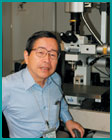Japan is experiencing a "brain" boom. Brain-related books claiming to train your brain fill shelves and "brain corners" of nearly every bookstore in Japan and video games that "improve the age of brain" have long waiting lists in fulfilling orders. Even on the evening newspaper publishes a "Train the Brain" column with all manner of quizzes for its readers. How should brain researchers respond to this social craze?
Should we completely ignore it? Should we dismiss the ideas driving this craze as nonsense and say that questionable "experts" who cannot provide reliable evidence to support their claims tout the products? Or, should we clearly point out that such books and games have no real scientific support because we know so little about even basic processes of the brain, including how synapses and neurons actually work?
Scientific activities, including brain science, account for a significant portion of the national budget; a simple look at the Third Science and Technology Basic Program clearly shows that (http://www8.cao.go.jp/cstp/english/basic/3rd-BasicPlan_outline.pdf). Researchers, therefore, are obliged to explain their results and show their relevance to the public. Now, more than ever before, researcher must participate in informative outreach activities that explain research results clearly to the public and inspire the next generation of scientists.
In light of the current brain boom, how should those in brain science develop meaningful outreach activities? After all, most people believe that the brain governs all human cognitive experiences, intelligence, emotions and will. It is the home of the mind. It is no surprise that brain research attracts attention. Moreover, while knowledge about the farthest reaches of the galaxy is intellectually attractive and important, the work of astronomers bears little direct impact on day-to-day human existence-brain science discoveries can. People have expectations about neuroscientific research whether they expect to be able to enhance memory and intellectual ability or learn tricks that improve our children's academic performance. The products of brain science can easily pique public interest and curiosity. At the same time, concerns about individual intellectual and emotion performance also create space for vast misunderstandings and ill-conceived treatments.
These brain improvement products that are bombarding Japanese consumers are examples of such ill-conceived responses. When these fail to help and the boom ends, what will happen to the public support and interest in brain science? Perhaps history can help us see one likely outcome from this brain fad.
More mature readers may remember when monosodium glutamate (MSG) was all the rage in the nineteen-fifties. One of RIKEN's founders, Dr. Kikunae Ikeda, first discovered that MSG could enhance the flavor of foods, leading to its early popularity. However, when Professor Takashi Hayashi of the Faculty of Medicine at Keio University issued a paper in 1954 showing that MSG induces a strong excitatory action in the cerebral cortex of dogs, MSG's fate radically changed. The historical importance of Prof. Hayashi's report is not in dispute. He was the first to show that MSG was an excitatory neurotransmitter, a mechanism that was eventually confirmed in the late eighties. This finding, from this scientific viewpoint, is one of Japan's greatest contributions to brain science.
However, Prof. Hayashi's claim that MSG promotes brain activity propelled MSG into a culinary fad. Households sprinkled MSG on their meals! It may seem strange, but many people my age ate MSG garnished rice. Even more bizarrely, a kindergarten actually gave MSG to children and measured changes in IQ. Only later did researchers learn that MSG could not pass the blood brain barrier. Soon sales of MSG cooled and many forgot about it. Much later, Prof. John Olney and colleagues in the United States found that giving MSG to infants could be quite harmful. Why? Because the blood-brain barriers in infants are underdeveloped, so MSG can enter the brain and act as an excitatory neurotoxin.
A scientific discovery about MSG's activities in the brain triggered excited that become a widely held misconception that eating MSG would improve brain function. This lead to a sharp, illogical demand for MSG by people who wanted to be smarter despite the fact that no explanation of the process by which MSG's excitatory action on the cerebrum or its impact on intellectual ability had been studied. The spread of such an unscientific and illogical notion created a dangerous social response. When I see the brain training products currently tempting society, that MSG boom comes to mind. I can even see the same aberrant logic driving the fad and I fear the same outcome.
Clearly, brain science has the ability to directly influence the daily lives of people and their view of humankind. Therefore, we must be cautious when we reveal our findings to the public. When explaining research results to the public, they must be presented within the complete scientific context. Scientifically problematic theories are ripe, so it is very important to provide society with correct information and with appropriate caution. In fact, it may be necessary to clearly share the significance of every research result that has been accepted for publication in a peer-reviewed journal. There is pride in such acceptance. Proof of that? I was very happy that BSI accepted me into its embrace in April 2005 based on my scientific achievements. For details of the research carried out by our research unit, please visit http://www.brain.riken.jp/en/t_tsumoto.html.






